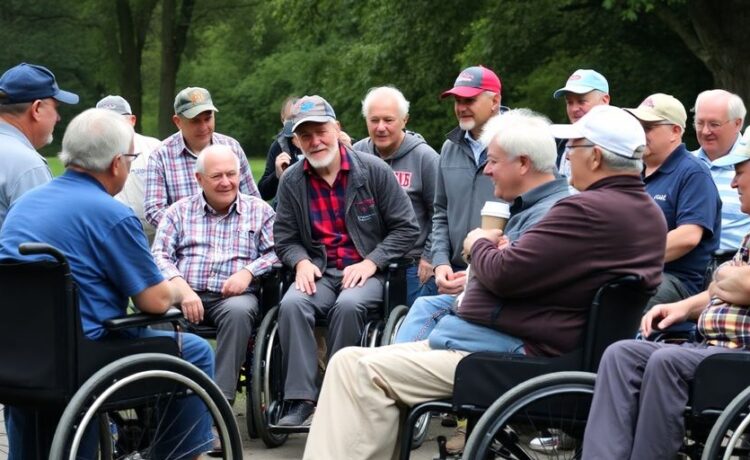The Link Between Military Service and Mesothelioma
Many veterans are familiar with the risks associated with military service, but few anticipate the long-term health consequences of asbestos exposure. During the mid-20th century, asbestos was widely used in shipbuilding, construction, and vehicle maintenance – all common duties for service members. This mineral’s heat-resistant and insulating properties made it a popular choice, but its tiny fibers, when disturbed, can become airborne and inhaled or ingested. Once inside the body, these fibers can lodge in the lining of the lungs, abdomen, or heart, leading to inflammation and, over decades, the development of mesothelioma. The latency period for mesothelioma can be anywhere from 10 to 70 years, meaning a diagnosis today could stem from exposure many years ago during service. Veterans diagnosed with mesothelioma may be eligible for VA benefits if their illness is linked to their time in the military.
Navigating a Mesothelioma Diagnosis
Receiving a mesothelioma diagnosis can be overwhelming, especially for veterans who are accustomed to a certain level of structure and support. The disease itself presents unique challenges due to its aggressive nature and the often-delayed onset after asbestos exposure. For veterans, this diagnosis can bring a complex mix of emotions, including anger, fear, and confusion, particularly when trying to understand how their service might have led to this illness. The medical journey involves understanding treatment options, which can include surgery, chemotherapy, and radiation, each with its own set of side effects and recovery processes. It’s a path that requires careful planning and a strong support system.
The Emotional Toll of Mesothelioma
Beyond the physical symptoms and medical treatments, mesothelioma exacts a significant emotional toll. Veterans may grapple with feelings of betrayal, wondering why they were exposed to such a dangerous substance during their service. The uncertainty of the future, the physical limitations imposed by the disease, and the potential impact on loved ones can lead to anxiety and depression. This emotional burden is often compounded by the isolation that can accompany a serious illness. Finding ways to cope with these feelings is just as important as managing the physical aspects of the disease. Support groups can provide a space to share these burdens and find comfort in shared experiences.
Benefits of Mesothelioma Support Groups for Veterans
Shared Experiences and Emotional Validation
Connecting with others who have gone through similar health challenges can be incredibly helpful. In a support group, veterans can share their personal stories and feelings without fear of judgment. This shared experience can lead to a sense of validation, making individuals feel less alone in their struggles. Hearing how others cope with their diagnosis and treatment can provide comfort and a feeling of solidarity. It’s a place where people truly get what you’re going through.
Access to Practical Information and Resources
Support groups often become hubs for practical advice. Members frequently exchange tips on managing symptoms, understanding treatment options, and dealing with the day-to-day realities of living with mesothelioma. You might learn about specific VA benefits or other programs designed to help veterans. For instance, understanding eligibility criteria for veterans seeking benefits can be simplified through group discussions. This collective knowledge base can be a significant asset.
Building a Network of Hope and Resilience
Beyond just sharing problems, these groups help build a network of hope. Seeing others actively managing their condition and finding moments of joy can be inspiring. This community can help foster resilience, encouraging members to face their challenges with a more positive outlook. It’s about finding strength together and reminding each other that a diagnosis is not the end of the story. Many find that connecting with fellow veterans, especially through resources like Veterans Community Care Program, can make a big difference.
Finding the Right Mesothelioma Support Groups for Veterans
Identifying Veteran-Specific Support Networks
When looking for a support group, it’s helpful to find one that understands the unique experiences of military service. Many veterans find comfort in groups specifically for those who have served. These groups often have members who share similar backgrounds, which can make conversations easier. They understand the jargon, the deployments, and the camaraderie that comes with military life. This shared history can be a big part of feeling understood. You might find these groups through veteran organizations or by asking your VA doctor.
Online vs. In-Person Support Group Options
There are different ways to connect with others. Some people prefer meeting face-to-face, while others find online groups more convenient. In-person meetings allow for direct interaction and a strong sense of community. Online groups, on the other hand, offer flexibility. You can join from anywhere, at any time, which is great if travel is difficult. Many groups offer both options, so you can choose what works best for you. It’s about finding a format that fits your life and your needs. You can explore options through organizations like Mesothelioma Hub.
Evaluating the Effectiveness of a Support Group
Not all support groups are the same, and it’s okay to try a few before settling on one. Think about what you want to get out of the group. Are you looking for practical advice, emotional support, or just a place to talk? A good group should feel welcoming and safe. You should feel heard and respected. Consider these points when deciding if a group is a good fit:
- Facilitation: Is there a leader or facilitator who guides the conversation?
- Participation: Do members seem engaged and supportive of each other?
- Information: Does the group share helpful resources or insights?
- Comfort: Do you feel comfortable sharing your own experiences?
It’s important to find a group where you feel you can be open and honest. Remember, support groups offer a vital connection for patients and their families.
Key Features of Effective Mesothelioma Support
Facilitated Discussions and Expert Insights
Effective mesothelioma support groups often feature guided conversations. These aren’t just casual chats; they’re structured to address specific concerns veterans might have. Think of it as having a knowledgeable guide helping the group explore topics like treatment options or managing side effects. Sometimes, guest speakers like oncologists or patient advocates might join in, sharing their knowledge. This provides a direct line to reliable information, cutting through the noise you might find elsewhere. It’s about getting clear answers from people who really know their stuff.
Peer-to-Peer Connection and Camaraderie
Beyond the structured talks, the real magic often happens in the peer connections. Talking with other veterans who are going through similar experiences can be incredibly validating. You’re not alone in this. Sharing stories, even the tough ones, builds a sense of shared understanding and camaraderie. It’s a place where people just get it without needing a long explanation. This mutual support can make a big difference in how you cope day-to-day. It’s about finding people who have walked a similar path and can offer encouragement.
Resources for Caregivers and Families
Mesothelioma affects more than just the patient; families and caregivers are deeply involved. Good support groups recognize this and provide resources tailored for them too. This might include information on how to manage the practical side of things, like financial planning or understanding treatment plans from a family perspective. Caregivers often need their own support system, and these groups can help connect them with others who understand their unique challenges. It’s a holistic approach to care, acknowledging everyone involved.
Connecting with Mesothelioma Support Groups for Veterans
Identifying Veteran-Specific Support Networks
Finding a support group that understands the unique challenges faced by veterans is important. Many organizations focus specifically on helping veterans who have been diagnosed with mesothelioma. These groups often have members who have served in similar branches or capacities, leading to a deeper sense of shared experience. Look for groups that acknowledge the specific asbestos exposures common in military settings. Connecting with fellow veterans can provide a unique form of validation and understanding.
Online vs. In-Person Support Group Options
When looking for support, consider whether an online or in-person group best suits your needs. Online groups offer flexibility, allowing participation from home, which can be beneficial for those with mobility issues or who live far from meeting locations. They often provide a wider reach, connecting individuals across different geographic areas. In-person groups, on the other hand, can offer a more direct, face-to-face connection and a stronger sense of immediate community. Many veterans find that a mix of both can be effective. You can explore resources like Mesothelioma.com’s veteran support to see what options are available.
Evaluating the Effectiveness of a Support Group
Not all support groups are created equal, and it’s okay to find one that feels right for you. Consider what you hope to gain from a group. Are you looking for practical advice, emotional support, or both? An effective group will likely have a facilitator who guides discussions and ensures everyone has a chance to speak. It should also feel like a safe space where you can share your experiences without judgment. Some groups may offer access to professionals, like counselors, who can provide additional guidance. If a group doesn’t feel like a good fit after a few meetings, don’t hesitate to explore other options. Many find that groups specifically for cancer patients and veterans offer a good starting point.
Maximizing Your Support Group Experience
Active Participation and Engagement
Getting the most out of a support group means showing up and being present. It’s not just about listening; it’s about sharing when you feel ready. Think of it as a conversation, not a lecture. Ask questions, share your own experiences, and offer support to others. Your involvement helps create a stronger, more helpful community for everyone. Sometimes, just talking about your day or a specific challenge can make a big difference. Don’t be afraid to speak up; your voice matters.
Setting Realistic Expectations
Support groups are wonderful, but they aren’t magic cures. People attend for different reasons, and everyone is at a different stage of their journey. Some meetings might feel incredibly uplifting, while others might be more somber. It’s important to remember that the group’s purpose is to provide comfort, information, and a sense of connection, not to solve every problem instantly. You might find that some groups are a better fit for you than others, and that’s perfectly okay. Finding the right community can take time.
Integrating Support into Your Treatment Journey
Think of your support group as another tool in your treatment plan, much like your medical appointments or therapy. It can complement your medical care by addressing the emotional and practical aspects of living with mesothelioma. Sharing insights from the group with your doctor or caregiver can sometimes lead to new perspectives on your treatment. Many veterans find that connecting with resources like the VA benefits application process [83e7] can be a helpful step alongside their support network. Remember, you don’t have to go through this alone; integrating this support can make your journey more manageable.











